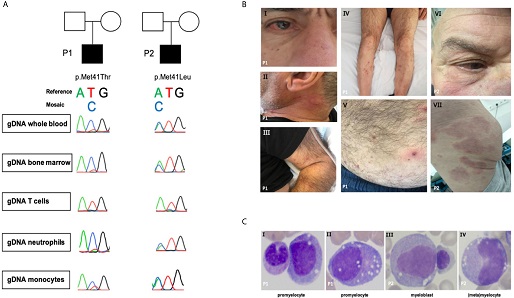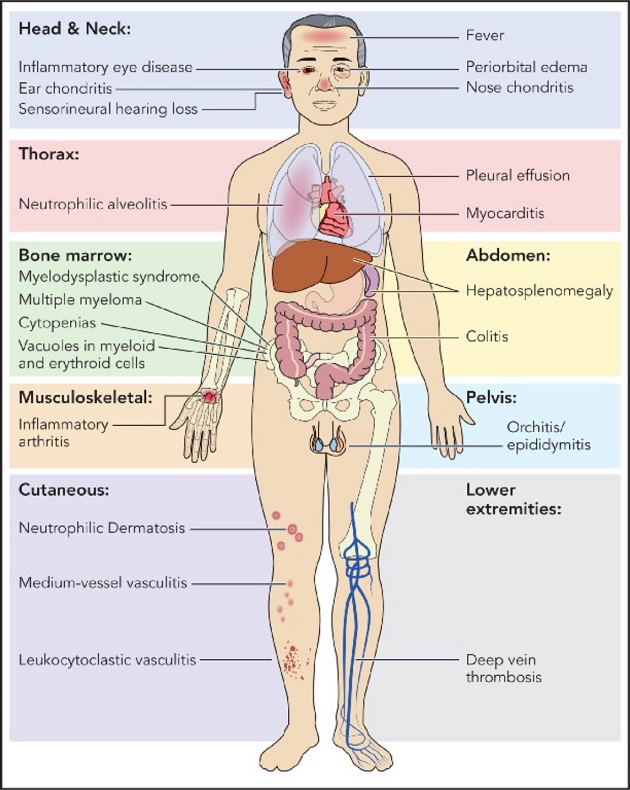U.S. Medical News: U.S. NIH Study Discovers Shocking Prevalence Of Mysterious VEXAS Syndrome Caused By UBA1 Gene Variants In The United States
U.S. Medical News - VEXAS Syndrome Feb 10, 2023 2 years, 1 month, 2 weeks, 6 days, 12 hours, 14 minutes ago
U.S. Medical News: Unknown to many, a mysterious disease has been growing in prevalence and affecting a number of older Americans, either killing them in the short term or shortening their lifespans. The disease known as VEXAS syndrome is a disease that causes inflammatory and hematologic (blood) manifestations.

A previous U.S. NIH and NYU study identified that mutations in the UBA1 gene somatic variants of blood cells and are acquired later in life to be responsible for this VEXAS (The name stands for the various biological characteristics of the disease ie vacuoles, E1-ubiquitin-activating enzyme, X-linked, autoinflammatory, somatic) syndrome that results in manifestations of rheumatologic and hematologic.
https://www.medrxiv.org/content/10.1101/2022.07.27.22277962v1
This new study explored the prevalence and clinical manifestations of this disease.
The study findings showed that it is estimated that approximately 13,200 men and 2,300 women over the age of 50 in the United States have VEXAS syndrome. This mysterious illness was only recently understood to have a genetic basis, which was identified in 2020 by medical researchers at New York University Grossman School of Medicine.
The study by researchers from the National Human Genome Research Institute- National Institutes of Health, Bethesda, Maryland-USA also involved scientists New York University School of Medicine-USA, Geisinger Research-Maryland-USA, Department of Molecular and Functional Genomics-Geisinger, Pennsylvania-USA, National Cancer Institute, Maryland-USA and Washington University in St Louis, Missouri-USA.
Pathogenic variants are associated with a broad spectrum of clinical manifestations. Knowledge of prevalence, penetrance, and clinical characteristics of this disease have been limited by ascertainment biases based on known phenotypes.
The study team aimed to determine the prevalence of pathogenic variants in UBA1 and associated clinical manifestations in an unselected population using a genomic ascertainment approach.
This retrospective observational study evaluated UBA1 variants in exome data from 163 096 participants within the Geisinger MyCode Community Health Initiative. Clinical phenotypes were determined from Geisinger electronic health record data from January 1, 1996, to January 1, 2022.
For the study, exome sequencing was performed. Outcome measures included prevalence of somatic UBA1 variation; presence of rheumatologic, hematologic, pulmonary, dermatologic, and other findings in individuals with somatic UBA1 variation on review of the electronic health record; review of laboratory data; bone marrow biopsy pathology analysis; and in vitro enzymatic assays.
The study involving 163 096 participants (mean age, 52.8 years; 94% White; 61% women) showed that 11 individuals harbored likely somatic variants at known pathogenic UBA1 positions, with 11 of 11 (100%) having clinical manifestations consistent with VEXAS syndrome (9 male, 2 female).
A total of 5 of 11 individuals (45%) did not meet criteria for rheumatologic and/or hematologic diagnoses previously associated with VEXAS syndrome; however, all individuals had anemia (hemoglobin: mean, 7.8 g/dL; median, 7.5 g/dL), which was mostly macrocytic (
10/11 [91%]) with concomitant thrombocytopenia (10/11 [91%]).
Among the 11 patients identified, there was a pathogenic variant in 1 male participant prior to onset of VEXAS-related signs or symptoms and 2 female participants had disease with heterozygous variants.
A previously unreported UBA1 variant (c.1861A>T; p.Ser621Cys) was found in a symptomatic patient, with in vitro data supporting a catalytic defect and pathogenicity. Together, disease-causing UBA1 variants were found in 1 in 13 591 unrelated individuals (95% CI, 1:7775-1:23 758), 1 in 4269 men older than 50 years (95% CI, 1:2319-1:7859), and 1 in 26 238 women older than 50 years (95% CI, 1:7196-1:147 669).
The study findings provide an estimate of the prevalence and a description of the clinical manifestations of UBA1 variants associated with VEXAS syndrome within a single regional health system in the US. Additional studies are needed in unselected and genetically diverse populations to better define general population prevalence and phenotypic spectrum.
VEXAS syndrome is a rare but serious condition with a high mortality rate. Not much has been reported about in
U.S. Medical News coverages.
Alarmingly, approximately half of those diagnosed, mostly men, die within five years of diagnosis. The syndrome is often associated with unexplained fevers and low blood oxygen levels in individuals who have been diagnosed with other diseases such as rheumatoid arthritis, lupus, and blood cancer.
The manifesting symptoms are believed to be related to an overactive immune system, which causes inflammation and classifies VEXAS syndrome as an autoimmune disorder.
The study team said that they hope their findings will raise awareness of the disorder among physicians, particularly because high-dose steroids, JANUS kinase inhibitors, and bone marrow transplantation have proven effective in controlling some symptoms.
Geneticist and study lead investigator Dr David Beck, MD, Ph.D., an assistant professor in the Department of Medicine and the Department of Biochemistry and Molecular Pharmacology at NYU Langone Health said, “Now that we know VEXAS syndrome is more common than many other types of rheumatologic conditions, physicians need to add this condition to their list of potential diagnoses when confronted by patients with persistent and unexplained inflammation and low blood cell counts, or anemia.”
Dr Beck had also led the federal research team that initially identified the shared UBA1 mutation among VEXAS patients.
The study findings were published in the peer reviewed Journal of the American Medical Association (JAMA).
https://jamanetwork.com/journals/jama/article-abstract/2800661
The study team analyzed the electronic health records of 163,096 mostly white men and women in Pennsylvania who agreed to have their blood DNA screened for signs of genetic disease. Twelve were found to have the UBA1 mutation, with all experiencing VEXAS symptoms.
 Vexas Manifestations And Symptoms
According to the study team, statistically, this corresponded to one in 4,269 American men over age 50 and one in 26,238 women over age 50 having or are likely to develop the syndrome.
Vexas Manifestations And Symptoms
According to the study team, statistically, this corresponded to one in 4,269 American men over age 50 and one in 26,238 women over age 50 having or are likely to develop the syndrome.
According to the study team, alarmingly this is a higher prevalence figure than many other inflammatory conditions, including vasculitis and myeloid dysplasia syndrome.
Dr Beck added, “Our study findings offer the first glimpse of just how common VEXAS syndrome is in the United States, particularly among men, who also happen to be the most to die from it.”
Dr Beck is also currently leading several clinical research efforts into VEXAS syndrome at NYU Langone’s Center for Human Genetics and Genomics.
Past research, led by Dr Beck, traced the origins of the syndrome to a mutation, or change in the letter code that makes up DNA, in the gene UBA1 (short for ubiquitin-like modifier activating enzyme. The enzyme usually assists in protein breakdown.
In this initial study, the research team analyzed the electronic medical records of adult patients who volunteered to participate in the Geisinger MyCode Community Health Initiative. The program has been collecting data for more than 25 years from patients in Geisinger’s 10-plus hospitals in Central and Northeastern Pennsylvania. Almost all study participants who agreed to have their blood DNA tested were white; half were over the age of 60.
Dr Beck says that the study team next plans to analyze patient records in more racially diverse groups, especially among those with higher rates of rheumatologic and blood disease, to gain a more precise picture of who is most at risk of VEXAS syndrome. They also plan to look for additional genetic causes, test new therapies for the syndrome, and develop a simple blood test for UBA1 to make it easier to diagnose.
For the latest
U.S. Medical News, keep on logging to Thailand Medical News.

